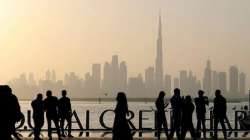Abu Dhabi announces several Covid-19 related curbs from July 19
The order, part of efforts to protect public health and prevent the spread of covid-19, will come into effect from July 19.

Abu Dhabi residents have been asked to stay home unless “absolutely necessary” as the Abu Dhabi Emergency, Crisis and Disasters Committee launched a new National Sterilization Programme.
The order, part of efforts to protect public health and prevent the spread of covid-19, will come into effect from July 19.
The restriction is applicable every day between midnight and 5 am, the time during which authorities will carry on the sterilization drive.
No movement of traffic and the public will be permitted at these times and a permit from Abu Dhabi Police needs to be obtained if one intends to get out for essential supplies, such as food and medicine.
As part of its strategy to limit the spread of covid-19, the Abu Dhabi Emergency, Crisis and Disasters Committee also updated the operating capacity of multiple public activities and approved new entry requirements for the capital.
Public and private beaches, parks and swimming pools, restaurants and cafes, gyms, spas and gyms in hotels, buses and public ferries will operate at 50 per cent capacity from July 19.
Malls are to operate at 40 per cent and cinemas at 30 per cent capacity. A maximum of three passengers will be allowed to travel in a five-passenger taxi and four passengers in a seven-passenger taxi.
As for the entry requirements, the committee approved allowing entry to the emirate within 48 hours of receiving a negative PCR test result and within 24 hours of receiving a negative DPI result.
Those entering via PCR, must take a PCR test on day four of entry (if staying for four days or more), and an additional test on day eight (for those staying eight days or more).
Those entering via DPI must take a PCR test on day three of entry (for stays of 48 hours or more), and an additional PCR test on day seven for those staying seven days or more.
These procedures apply to all vaccinated and non-vaccinated citizens and residents, and anyone failing to take the required tests will be fined.
The committee called on community members to adhere to preventive measures, maintain physical distancing, and wear masks in public places to preserve public health gains.
ALSO READ: Five or more symptoms in first week of infection linked to long COVID: Study
